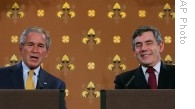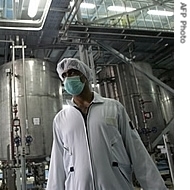VOA标准英语2008年-Experts Debate Possibility, Effectiveness of Fu
搜索关注在线英语听力室公众号:tingroom,领取免费英语资料大礼包。
(单词翻译)
By Sonja Pace
London
18 June 2008
How best to deal with Iran and its nuclear ambitions was a major theme throughout President Bush's just completed tour of European countries. He spoke1 again of all options to prevent Iran from acquiring nuclear weapons and found some support in Europe for further sanctions against Tehran. But, views are mixed about whether the current strategy will have an effect. VOA's Sonja Pace reports from London.
 |
| U.S. President George W. Bush (l) is seen at a press conference with British Prime Minister Gordon Brown (r) at the Foreign and Commonwealth2 Office in London, 16 Jun 2008 |
Iran came up at nearly every stop on President Bush's Europe visit and his message remained much the same, as again during a news conference in London.
"To provide pressure necessary to solve the problem diplomatically, that is my first choice. Iranians must understand that all options are on the table, however," he said.
The options include increased sanctions and isolation3 for Iran if it continues its nuclear enrichment program, or help to develop its civilian4 nuclear energy program and increased business, trade and investment if it stops producing its own nuclear fuel.
Talks have been ongoing5 and the European Union foreign policy chief, Javier Solana, delivered a new package of economic incentives6 to the Iranians on Saturday in an effort to get them to comply with international demands to stop enriching uranium that could be used for nuclear weapons.
Speaking alongside President Bush in London on Monday, British Prime Minister Gordon Brown warned Iran that time is running out.
"If Iran continues to ignore resolutions, to ignore our offers of partnership7, we have no choice, but to intensify8 sanctions - and so today Britain will urge Europe and Europe will agree to take further sanctions against Iran," he said.
Mr. Brown announced that Britain is freezing overseas assets of Iran's largest bank and he vowed9 action on a new phase of sanctions on the oil and gas sectors10.
 |
| An Iranian technician works at the Isfahan Uranium Conversion11 Facilities (UCF), 420 kms south of Tehran (File) |
Iran remains12 defiant13 with the official Iranian news agency quoting Deputy Foreign Minister Ali Reza Sheikh Attar as saying uranium enrichment would continue.
At the Center for Arab and Iranian Studies in London, Iran analyst14 Ali Reza Nourizadeh tells VOA the international community must stay firm.
"This time President Bush and Prime Minister Brown and other European leaders are telling Iranians that they are more serious than before and this proposal is the last one," he said. "Take it or leave it."
Nourizadeh says that might get Iran to finally negotiate in good faith.
Others are not so sure. Political analyst, Michael Cox of the London School of Economics says targeted sanctions can have an impact, but notes that divisions within the international community make getting tougher and more comprehensive sanctions less likely.
"When oil prices are running at between $135 to $140 a barrel, when Russia and China, two permanent members of the Security Council, are not prepared to go with sanctions and indeed some European countries are not very keen on sanctions, including France and Germany," he explained. "On all those issues I think it is going to be very difficult to get a really serious sanctions regime."
Cox says the high price of oil is making the Iranians confident they can outlast15 any sanctions threat. As for the ultimate military option, Cox says the Europeans are vehemently16 against it.
Iran insists it wants to develop nuclear power for peaceful means only, but many in the international community do not believe that and fear Iran could soon have a nuclear weapon.
 收听单词发音
收听单词发音 




